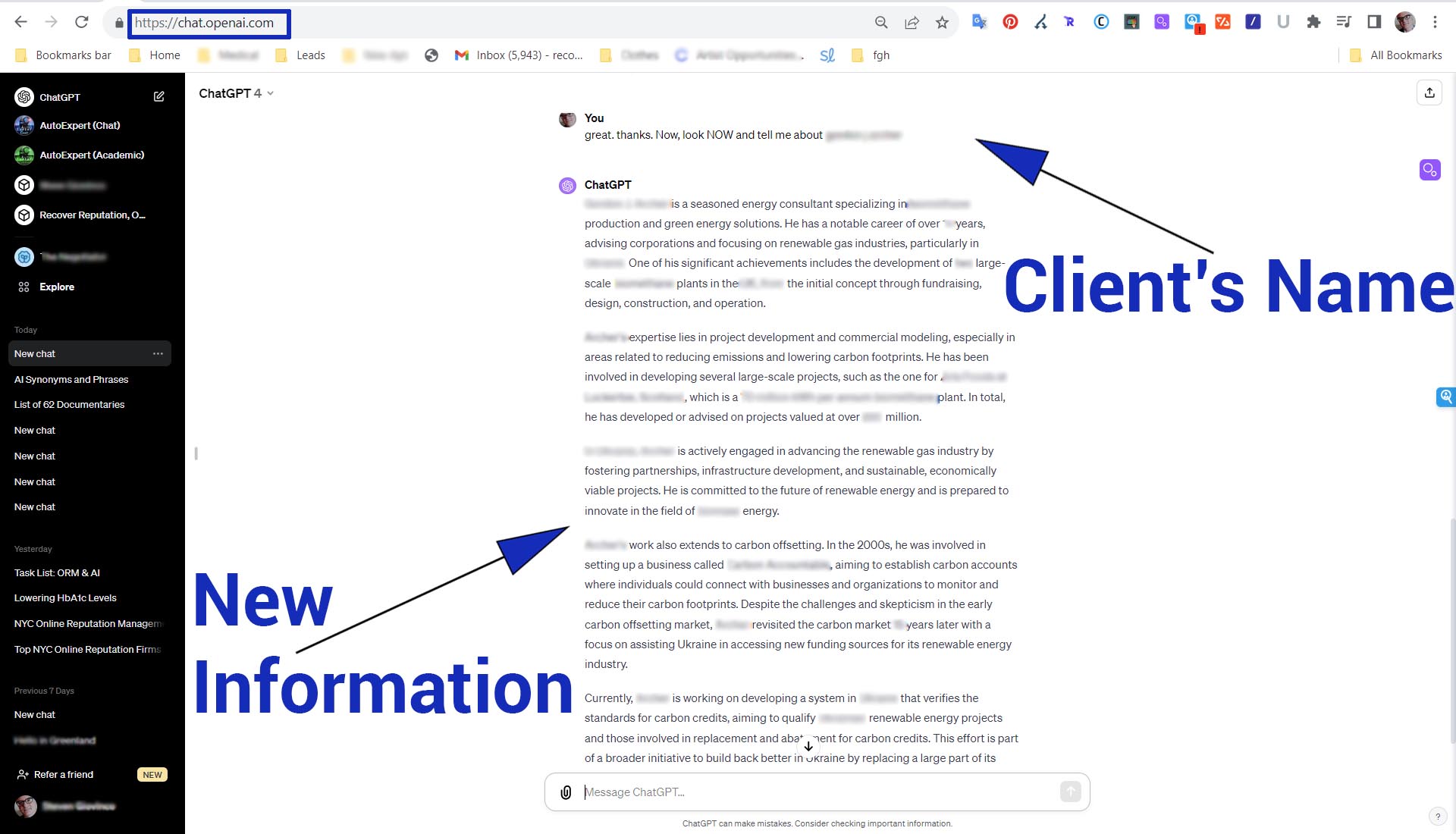Last Updated on February 20, 2024 by Steven W. Giovinco
Cautionary Tale and Opportunity for AI in Reputation Management
What if AI leads to unintended consequences, such as lost income and damage to a company’s reputation?
This just happened to a major airline, Air Canada, and could be the harbinger of things to come. In this case, AI went haywire and led to pricing mistakes.
AI’s Influence on Corporate Reputation: Chatbot and
The chatbot incident is an important warning of how AI reputation management can go awry, causing unintended damage which CEOs need to be aware of. Promising to revolutionize customer service with efficient round-the-clock availability, AI instead highlights reputational risks due to inaccurate information.
The integration of AI technologies, such as chatbots, into customer service is a significant shift in how companies interact with people. These systems promise efficiency, scalability, and the ability to provide instant responses to customers/clients outside traditional working hours. However, as seen in the Air Canada incident, they also introduce new problems to a company’s reputation, particularly when the information deployed is incorrect or misleading.
New Problems for Company Reputation
This stresses the importance of oversight but also shows the far-reaching effects on a company’s reputation when AI fails. Importantly, it stresses legal and ethical issues firms face, making it clear that blaming AI’s auto-responses is not a shield for a business from negative results.
Navigating AI’s New Challenges
The Importance of Oversight and Accuracy
To maneuver these new problems, businesses and CEOs should conduct thorough AI testing to avoid costly and embarrassing reputation issues. This includes human oversight, openness, and actively seeking customer input, striving for balance between AI innovation and the maintenance of trust and integrity in their digital presence.
Real-World Example: Air Canada AI Chatbot
The Air Canada chatbot incident should be a warning to CEOs how customer service can go wrong. It highlights the intersection of AI innovation and reputation management and can be a harsh reminder businesses face when deploying AI in the real-world.
What Happened with Air Canada: A Cautionary Tale
Air Canada’s AI chatbot incorrectly informed a passenger that he could claim a bereavement discount after buying his ticket. However, this is actually not true. It goes against the airline’s policy which requires discounts to be arranged before the trip.
Despite attempts to fix this, including offering a future flight coupon, the passenger, Jake Moffat, made a claim to Canada’s Civil Resolution Tribunal. The tribunal ruled against Air Canada, basically saying that the company IS responsible for the chatbot’s actions and the accuracy of the information provided on its website.
This not only led to a penalty for Air Canada but also highlights the implications of AI in customer service. It is a reminder of the need for accuracy and the potential reputational risks of relying on AI systems without the backing of people.
AI Can Be A Double-Edged Sword for Customer Service
Integrating AI chatbots into customer interactions promises efficiency, 24/7 availability, and immediate answers for clients. However, as Air Canada saw, it also introduces potential reputational risks when the information provided is wrong or misleading.
Accuracy is Key
Correct and reliable information is the key to effective reputation management, of course. When AI systems like Air Canada’s chatbot produce false results, the impact can be costly, because it affects the broader perception of the company, its leadership and ultimately the CEO’s reputation. This should be a wake-up call to underscore the importance of testing and continuous monitoring of AI to make sure they represent true company policies and customer expectations.
Beyond the Technology: Legal and Ethical Concerns
The legal implications of the Air Canada case highlight the evolving landscape of accountability in the age of AI. Companies relying on AI to connect with customers must be ready to navigate the legal and ethical complexities of these systems’. The firms are ultimately responsible for Chat’s answers, and attributing errors to the “autonomous” nature of AI won’t absolve them of liability.
Mitigating Risks, Seizing Opportunities
Several strategies can help mitigate risks associated with AI in reputation management:
- Continuous Learning: Design AI systems to learn from mistakes and adapt to improve accuracy over time.
- Human Oversight: Implement human oversight of AI interactions to catch and correct errors before they escalate.
- Transparency & Communication: Be transparent about using AI and proactive in communicating corrections or updates when inaccuracies are identified.
- Customer Feedback Loops: Gather customer feedback to identify issues with AI systems early and improve the customer experience.
Problems of AI Reputation
The Air Canada chatbot debacle should be a lesson in AI and reputation management. While chatbots promise better customer service, efficiency, and constant availability, the reality reveals significant reputational risks connected if it is sharing incorrect or misleading information.
Ultimately, this underscores the critical need for accuracy in online connection and highlights the broader implications for a company’s reputation when AI fails. Also, legal and ethical challenges underscore the accountability companies must accept for their AI’s actions–meaning that errors in their chatbots do not exempt a business from liability.
To mitigate risks and capitalize on AI’s potential for positive reputation management, companies need to prioritize rigorous AI system testing, human oversight, transparency, and customer feedback. The Air Canada case ultimately demonstrates the delicate balance between leveraging AI for innovation and ensuring ethical, accurate interactions that uphold a company’s reputation in the digital landscape.
The Future of AI in Reputation Management
AI holds immense potential to shape the future of reputation management. From predictive analytics to personalized interactions, the opportunities seem vast. However, the Air Canada case should be cautionary. Balancing innovation with ethical considerations and a commitment to accuracy is crucial to harnessing AI for building and maintaining trust with customers and the public.



